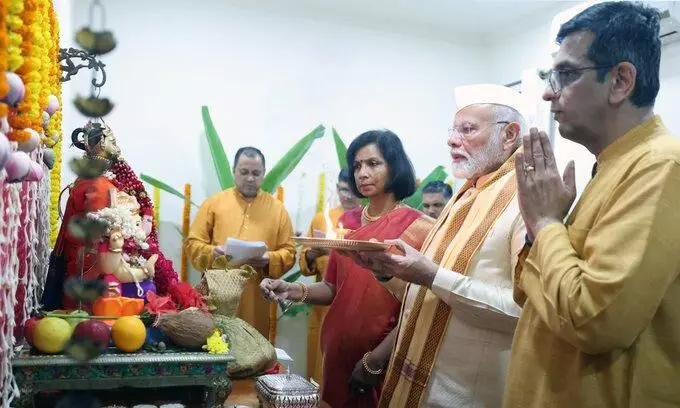
Justice must not only be done but also…, activists remind CJI of Lord Hewart’s dictum
text_fieldsIn a statement released on Friday, nearly 30 eminent citizens, including lawyers, former bureaucrats, academics, and activists, have expressed their concerns regarding Prime Minister Narendra Modi’s participation in a Ganapati Puja at the residence of Chief Justice of India (CJI) D.Y. Chandrachud.
The statement criticises the participation of Modi, who is seen as holding one of the highest Constitutional offices in India, in a religious function hosted by the head of the judiciary. The signatories argue that such actions, while within the individual’s rights, could potentially influence public trust in the impartiality of judicial proceedings and the separation of powers between the executive and judiciary branches.
The statement underscores the principle that “justice must not only be done but must also be seen to be done,” a dictum established by Lord Hewart in the 1924 case of Rex v. Sussex Justices.
This principle, reaffirmed by the Supreme Court of India in its “Restatement of Values of Judicial Life” adopted on 7th May 1997, emphasises that the behaviour and conduct of members of the higher judiciary must uphold public confidence in judicial impartiality.
The signatories highlight that recent political developments, including hate speeches by senior political figures and the joining of political parties by members of the higher judiciary after demitting office, exacerbate concerns about judicial independence. They refer to Abhijit Gangopadhyay’s recent transition from the Calcutta High Court to the BJP, as well as instances of former members of the judiciary attending events organised by politically affiliated groups like the Vishwa Hindu Parishad.
The statement notes the recent lifting of a 44-year-old ban on public servants joining the Rashtriya Swayamsevak Sangh (RSS), which has intensified scrutiny of the perceived nexus between political and judicial bodies.
The citizens’ statement asserts that the judiciary must maintain the highest standards of conduct to demonstrate its independence from the executive branch. This is especially critical in a context where the State, led by the political executive, is frequently involved in litigation before the courts and where there is a risk of the rights of citizens being undermined.
In their appeal, the signatories urge the Chief Justice of India and other Supreme Court justices to adhere strictly to the “Restatement of Values of Judicial Life” and to ensure that their actions outside their judicial duties align with the highest norms of judicial conduct.
They stress that maintaining a clear boundary between judicial and executive functions is essential for preserving the integrity and public confidence in the judiciary.
Signatories
E.A.S. Sarma, IAS (Retd), Former Secretary GOI
Dr. Aruna Roy, IAS (Resigned), MKSS
Dr. Jagdeep Chhokar, Association for Democratic Reforms
Kavitha Srivatsava, Peoples Union for Civil Liberties
Aditi Mehta, IAS (Retd), Former Additional Chief Secretary, Rajasthan
Meena Gupta, IAS (Retd), Former Secretary, GOI
Sebastian Morris, IIMA, GIM
M.G. Devasahayam, IAS (Retd), Former Secretary, Haryana.
V.P. Raja IAS (Retd), Former Chairman, MSEB
Dinesh Abrol, CSIR (Retd)
Rani Sarma, Author, Heritage Activist
Noor Sridhar, Wake up Karnataka
M.C. Rajan, Human Rights Advocate
Meera Sanghamitra, NAPM
Nityanand Jayaraman, Writer, Social Activist
Archana Prasad, Jawaharlal Nehru University
Annie Raja, NFIW
Priya Dharshini, Delhi Forum
Dr. Vasanthi Devi, Former Vice Chancellor, MS University
Joe Athialy, Centre for Financial Accountability
Sundar Rajan, Friends of Earth, Chennai
Sridhar, Journalist
Mariam Dhawale, All India Democratic Women’s Association
Elangovan- DREUPA
Dr. Thomas Issac, Former Finance Minister, Kerala
Dr. Indira Jaisingh, Sr. Counsel. Sup. Court
Venkatesh Athreya, Economist
Thomas Franco, Peoples’ Commission & Former GS, AIBOC





